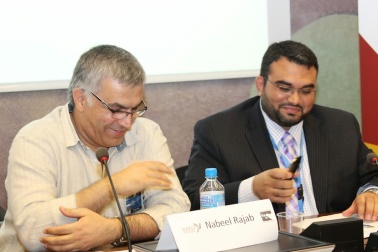On Wednesday October 1, 2014, the Government of Bahrain arrested prominent Bahraini human rights defender, Nabeel Rajab, allegedly on account of remarks he made on Twitter on September 28. The government’s detainment of Nabeel goes directly against the spirit of Article 19 of the Universal Declaration of Human Rights (UDHR), which states, “Everyone has the right to freedom of opinion and expression; this right includes freedom to hold opinions without interference and to seek, receive and impart information and ideas through any media and regardless of frontiers”, as well as the International Convention on Civil & Political Rights (ICCPR), which Bahrain ratified in 2006. Nabeel’s remarks concerned reported ties between Bahrain’s security institution and Bahraini members of ISIS, which the government considered to be “denigrating” to government institutions. The government cannot change the facts, so it instead targets those who publicize them.
As President of the Bahrain Center for Human Rights and Director of the Gulf Center for Human Rights, Nabeel is at the forefront of those who have been calling for reform in Bahrain. In the days prior to his arrest, Nabeel was engaged in a European advocacy tour that commenced with his participation in the 27th Session of the Human Rights Council in Geneva, Switzerland. During this tour, Nabeel also met with members of the European Parliament and several individual states that are concerned about the human rights situation in Bahrain. Throughout the course of his trip, Nabeel publicly criticized the Government of Bahrain for human rights abuses and called on the international community to do more to pressure Bahrain to abide by international standards of human rights.
The government has already imprisoned Nabeel once—for two years from July 2012 to May 2014—for his human rights work, and threatens to do so again. His detention is not unique; it is but the newest case in a long list of human rights defenders who have been arrested in Bahrain for expressing their political opinions. On August 30, Maryam al-Khawaja, another prominent human rights defender, was arrested upon entering the country to see her ailing father, Abdulhadi al-Khawaja, who was on hunger strike in prison in Bahrain. Like Nabeel, Maryam has also been vocal about the government’s human rights record and actively engages with leaders around the world, including the US Congress, about the situation in Bahrain.
In Nabeel’s case, the government arrested him on account of Article 216 of the Bahraini penal code, which states, “A person shall be liable for imprisonment or payment of a fine if he offends by any method of expression the National Assembly, or other constitutional institutions, the army, law courts, authorities or government agencies.” Article 216 of the Bahraini penal code is in clear contradiction to Article 19 of the UDHR, severely limiting the ability of Bahrainis to exercise their right to freedom of opinion and expression. The government has punished Nabeel twice before—in violation of international law—for remarks he made on Twitter, and will decide whether or not to do so again next week. Bahrain’s efforts to censor domestic criticism on the basis of “denigrating” government institutions are counterproductive, and only give more reason for censure.
–
Andrew Godziek is an Advocacy Intern at ADHRB.





